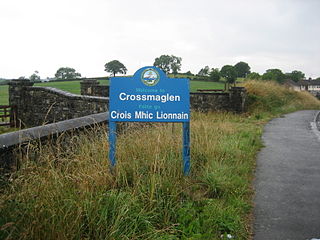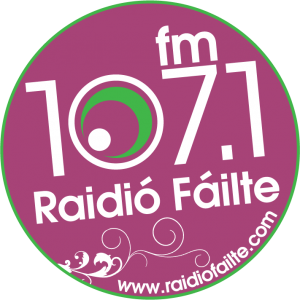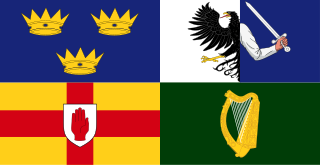
Crossmaglen is a village and townland in County Armagh, Northern Ireland. It had a population of 1,592 in the 2011 Census and is the largest village in South Armagh. The village centre is the site of a large Police Service of Northern Ireland base and formerly of an observation tower.
Dempsey is a surname of Irish origin.
Cullyhanna is a small village and townland in County Armagh, Northern Ireland. It lies on the main road between Newtownhamilton and Crossmaglen. It had a population of 306 in the 2001 Census. It is within the Newry and Mourne District Council area.

The Ó Catháin, meaning "descendants of Cahan", were a sept of the Cenél nEógain branch of the Northern Uí Néill in medieval Ireland. The surname is usually Anglicised in Ulster as O'Cahan or O'Kane. They originated in the Laggan district in the east of modern County Donegal in the west of Ulster, and from there moved eastwards in the twelfth century, ousting the Uí Conchobair from Keenaght in modern-day County Londonderry, also in Ulster. They held the lordship of Keenaght and Coleraine until the seventeenth century, to which it was commonly referred to as "O'Cahan's country". Under the sub-ordination of the Ó Néill clan of the Cenél nEógain, they held the privilege of inaugurating the chief of the Ó Néill by tossing a shoe over the new chief's head in acceptance of his rule.
William Ford was an Irish-American businessman and was the father of Ford Motor Company founder Henry Ford.
Tadhg Óg Ó Cianáin (IPA://) was an Irish writer.
Father Gerard McGinnity born on 5 April 1947 is an Irish Roman Catholic priest, currently serving as Parish Priest of Knockbridge, County Louth, Ireland, a parish of the Archdiocese of Armagh. He is best known for his role in denouncing the alleged homosexual orientation of the head of a Catholic seminary, and for his association with a group, the House of Prayer, Achill.

Raidió Fáilte is an Irish-language community radio station, broadcasting from Belfast, in Northern Ireland. It started broadcasting under its current licence on 15 September 2006 having operated as a pirate radio station for some time prior to that.
A Turkish name consists of an ad or an isim and a soyadı or soyisim (surname). Turkish names exist in a "full name" format. While there is only one soyadı (surname) in the full name there may be more than one ad. Married women may carry both their maiden and husband's surnames. The soyadı is written as the last element of the full name, after all given names.
McCaul, also spelt MacCawell is an Irish surname, derived from the Gaelic Mac Cathmhaoil, meaning the "son of Cathmhaol", descendant of being implied. The name Cathmhaoil itself is derived from cath mhaol meaning "battle chief". The Mac Cathmhaoil were the leading family of Cenél Fearadhaigh, of the Uí Néill, and were based around Clogher in modern-day County Tyrone, Northern Ireland. They were one of the seven powerful septs that supported the O'Neills. The name is now rare in Ulster as it has been Anglicised under various different forms such as, Campbell, McCawl, Caulfield, McCall, Alwell, Callwell, McCowell, McCuill, Howell, MacHall, and McQuade.
Sands MacSwineys Gaelic Football Club is a Gaelic football team formed in 1986 and based in the Lanarkshire town of Coatbridge. The club plays its home matches at St Ambrose Gaelic Ground.
The surname Gaughan is derived from the Old Gaelic name Ua Gáibhtheacháin, which dates to before the 10th century. Its meaning is "male descendant of a fierce warrior". However, other translations claim it means "anxious one", demonstrating their expeditious and industrious nature. Historically, Irish families were named after the first chief of their tribe. In this case, it is evident that this clan descends from an illustrious warrior. Other derivatives of Ua Gáibhtheacháin are: O'Gaughan, Gavan, Gavaghan, Gavahan, Gavigan and Gahan.
Fay is an Irish surname. The name derives from the Norman surname "de Fae" which was introduced to Ireland in the 12th century. It is commonly found in counties Westmeath, Cavan and Monaghan. The native Gaelic surnames Ó Fiaich and Ó Fathaigh are sometimes anglicised as Fay.
Tomás Ó Cobhthaigh was an Irish poet.
Ó Cobhthaigh is a Gaelic-Irish surname. It is now generally Anglicised Coffey or Coffee.
Liam Inglis (1709–1778) was a Gaelic-Irish poet and priest.

Ó hEidirsceoil is a Gaelic Irish clan who were rulers of the Dáirine sept of the Corcu Loígde until the Earl Modern period. The name is most prominent in County Cork and County Kerry. Their ancestors were Kings of Munster until the rise of the Eóganachta in the 7th century. At the start of the 13th century, three prominent branches of the family came into existence; Ó hÉidrisceoil Mór, Ó hÉidrisceoil Óg and Ó hÉidrisceoil Bhéarra. The Ó prefix was dropped by many in the Ireland of the 17th and 18th centuries.

Ó Ceallaigh is the most influential dynasty of the ancient túath of Uí Maine, and the original Irish Gaelic name for the surname commonly Anglicized as Kelley, Kelly, or Kellie. It is a name meaning "Descendant of Ceallach," "bright haired," or "troublesome." Though some have linked it to the old Irish "ceall" for "church."

Cultúrlann McAdam Ó Fiaich is an Irish language cultural centre in The Gaeltacht Quarter and is located on the Falls Road, Belfast. Opened in 1991, the centre underwent renovation in 2010 and was opened the following year by Irish President Mary McAleese.









